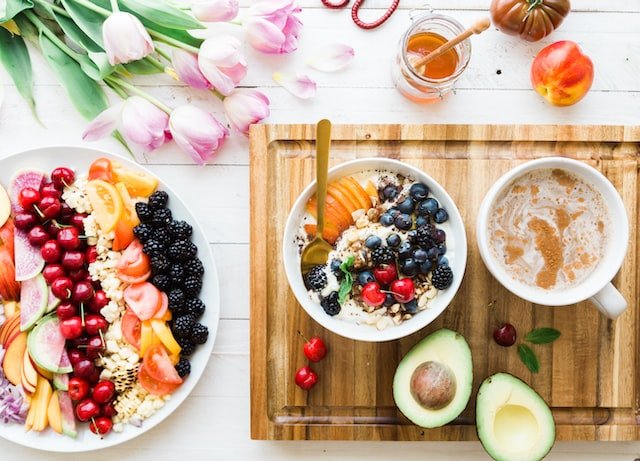
We often hear of the importance of having a good and healthy breakfast. But why?
Benefits of a good breakfast
A good breakfast:
- gives us the essential nutrients, vitamins and minerals we need to sustain the energy and drive for our day
- balances our blood sugar, thus stabilising our energy, weight, mood and focus
- starts our metabolism, helping us burn calories through the day
- boosts our energy, our heart and our brain
- stabilises our circadian rhythm
However, research can be divided as to the importance of having breakfast. We are all unique so we should listen to our own bodies when eating, be mindful about our hunger and rather than looking at one single meal, make sure we eat nutritionally all through the day.
And what is most important is what we eat at breakfast.
There are a few things to look at for:
- In an evolution point of view, we have not been designed to eat cereals. The agricultural revolution, during which we started eating cereals, is relatively recent and our digestive system has not been designed to digest large quantities of cereals. Especially so when these are poor in nutrients and high in sugar, salt and gluten. If having cereals for breakfast, aim to have a small quantity (about 30g) and make sure they are low in sugar, salt and gluten and high in fibre, good fats and proteins.
And stay away from so-called healthy cereals bars: they are loaded with sugar, salt and other additives, and devoid of healthy fibre. I make my own cereals, so I know exactly what is in it: organic oats with crushed nuts and seeds, which I top with kefir and seasonal fruits, simple and nutritious, full of good fibre, proteins and essential fats.
- If having milk, opt for full milk. Semi-skimmed or low-fat are devoid of nutrients or full of added sugars and additives. Provided you have a reasonable amount, full milk will provide you with good fats that sustain overall health. The same goes for other dairy products such as yogurts or butter. Have grass-fed butter instead of margarine or any low-fat product. Grass-fed butter is rich in nutrients and healthy fats whilst margarine or low-fat products are full of hydrogenated oils high in transfats and additives that increase the risks of many diseases. Or choose plant-based milk.
- Beware of fruit juices. These are often full of sugar and additives. We have been told it is healthy to have an orange juice at breakfast to boost our vitamin C. However, there are other ingredients with high levels of this vitamin such as red pepper, kiwis, blackcurrant, parsley, kale, lemons, broccoli or persimmons. I would also recommend you eat your orange whole to benefit from its fibre contents which are lost through juicing.
- Eggs have been demonised as increasing our bad cholesterol. However, egg are an essential source of good quality protein and studies have shown that dietary cholesterol does not impact serum cholesterol. Egg yolk is rich in antioxidants (lutein and zeaxanthin) essential to our vision.
- Beware of gluten-free products. These are often marketed as healthier options. Some of them are but the vast majority are full of sugar, thickeners, additives and other chemicals. Gluten-free does not equate healthy so if you need to eat a gluten-free diet, I recommend you seek the advice of a professional nutritionist to be sure your diet is optimal.
What is an ideal breakfast?
Balance carbs, good quality proteins, fibre and healthy fats.
Think: eggs, avocado, salmon, olives, full-fat cheese, nuts and seeds, raw fruits and vegetables.
A few suggestions for a healthy breakfast
Porridge – organic oats, sprouted oats, quinoa flakes, chia seeds, buckwheat. Make with unsweetened almond/rice/coconut/oat/or organic cows’ milk. Add a sprinkling of nuts and a few berries
Toast – rye, spelt, artisan, sourdough, wholegrain bread or pitta. Topped with sardines, eggs, nut butter, hummus, avocado, sliced tomato, mushrooms, cottage cheese
Eggs – scrambled, poached, omelette, boiled, frittata. Add peppers, spinach, kale, onion, tomato, mushrooms, watercress, chillies, peas or asparagus as soldiers alongside a soft-boiled egg. Or simply have egg combined with mashed avocado, and maybe a bit of smoked salmon
Yoghurt – coconut, soya, dairy-free, cows’ milk. Add nuts and seeds. Avoid fruit flavoured yoghurts, often very high in sugar. Add your own fruit instead
Pancakes – made with sweet potato, brown rice flour, chickpea flour, coconut flour, quinoa or buckwheat, oatmeal. Serve with fruit or berries, or mushrooms, butternut squash, tomatoes, leeks, cheese, herbs and spices
Homemade muesli – use organic oats or oat-bran as a base. Add a few sultanas, raisins, chopped dates, figs, or apricots, some chopped nuts and seeds, and seasonal fruits. Serve with kefir or plain full fat yogurt
What about you? What is your favourite breakfast? Please share so we can all feel inspired! And if you have found this article interesting, please feel free to share it or comment on it.
👉 If you are looking for more advice regarding your diet and lifestyle, feel free to get in touch on 07788 444 199 or info@biovitalnutrition.com or https://biovitalnutrition.com/contact/